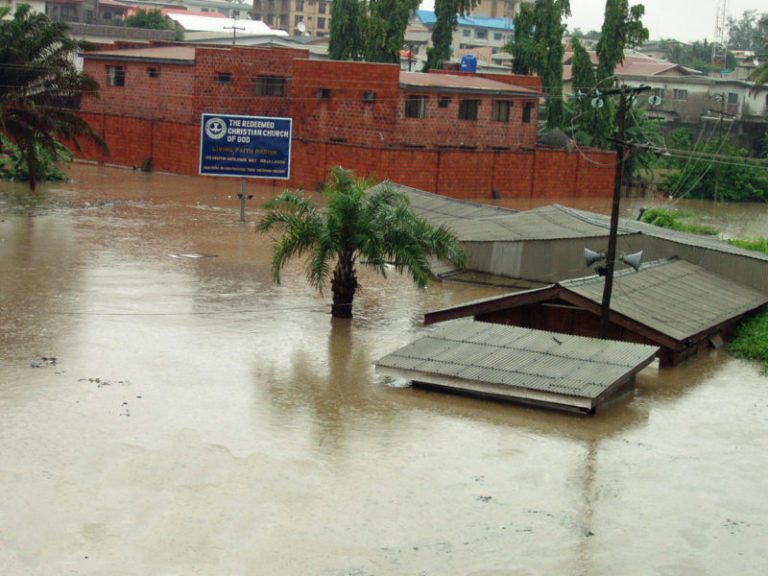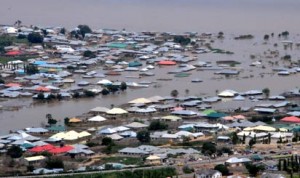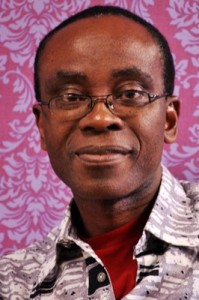 Dangote Cement has explained that its current enlightenment on several radio stations across the country is to educate and inform the public on the benefits of using quality cement especially the new Dangote 42.5 3X Cement in their construction works.
Dangote Cement has explained that its current enlightenment on several radio stations across the country is to educate and inform the public on the benefits of using quality cement especially the new Dangote 42.5 3X Cement in their construction works.
According to Director, Sales & Marketing, South South Region of Dangote Cement, Chux Mogbolu, the public awareness became necessary as research has shown that most cement users in Nigeria cannot differentiate between the various grades of cement and their uses hence leading to application of lower cement grade where higher grade cement is should have been used.
Mogbolu, speaking during a radio programme on Delta Broadcasting Service (DBS) at Asaba, said that because of the abysmal level of knowledge among artisans, block makers, masons and other craftsmen in the building industry, use of 32.5 grade cement in blocking making and house building has resulted in several cases of building collapse.
Describing the qualities of the new 42.5 cement grade, he said that the grinding is better, smoother which makes it to expel pockets of air therefore preventing cracks in pillars, beams and other areas where it is used. Dangote Cement 42.5 3X public awareness campaign, he stated, is more of a corporate social responsibility project as the company is concerned with the spate of building collapse and the resulting loss of lives and properties.
The Director enjoined the public to always buy Dangote Cement, as they will be buying peace of mind and will build with peace of mind adding that the quality of products from the cement company ensures that customers always come back why the goods do not come back.
It will be recalled that, as part of efforts towards eliminating the menace of building collapse, the Standard Organisation of Nigeria (SON) embarked on the standardisation of the basic inputs in building and construction like Iron and steel, roofing materials. Having completed standardisation in other areas, the agency set out to review cement standard. It adopted a holistic approach as to ensure that standards are maintained in all spheres of the building process.
Following widespread protests over rampant building collapse, the regulatory agency took the commendable step of immediate response to review cement standards in the country. The technical committee of SON consulted widely with stakeholders from all sectors including the Nigeria Society of Engineers, COREN, universities, researchers, builders, block makers towards fashioning a suitable cement standard regime.
The stakeholders agreed to streamline cement types, with 42.5 cement for general purposes while 32.5 will now be restricted to plastering work. SON’s effort at reviewing cement type standard is commendable as it will restore sanity to the system.
Why Dangote Cement is creating awareness on quality
World Bank invests in $120m Abuja shopping mall

The IFC, a member of the World Bank Group, has announced a $9.5 million investment in Jabi Lake Mall to support demand for modern business infrastructure and retail space in Abuja, Nigeria. The project will help create about 350 construction jobs and 900 long-term, retail-sector jobs.
The $120 million Jabi Lake Shopping Mall is being built on five hectares of land on the Jabi Lake waterfront at Jabi, Federal Capital Territory, Abuja. Once complete, it will be Nigeria’s largest shopping mall with over 30,000 square meters of shopping space. The project’s primary sponsor is the Actis Africa Real Estate Fund 2. Dual Properties is the joint venture partner alongside Actis.
Ms. Amanda Jean Baptiste, Director, Actis Africa Real Estate Fund 2, said, “Investing in the Jabs Lake Mall demonstrates Actis’s commitment to developing world-class retail destinations and adding to the domestic infrastructure in Nigeria, as well as our support for the growing demands of a rapidly changing economy. Our partnership with IFC will help us draw on their expertise in international best practice in the environmental and social aspects of the project that affect property development.”
Solomon Adegbie-Quaynor, IFC Country Manager for Nigeria, said, “Our investment is part of IFC’s strategy to help strengthen business infrastructure, contribute to economic growth, and increase job opportunities in Nigeria. Actis is a strong partner in this regard, that can also transfer best modern retail practices”.
Jabs Lake Mall will be the largest retail development of international standard in Abuja and create links to the local economy throughout its construction and operation. It will create new sales channels for Nigerian retailers, including local small and medium enterprises. Its construction will provide business opportunities for local suppliers of food, construction materials and services, and will serve as a catalyst for urban development in the area around the mall.
Construction began on the project in late 2013 and is expected to be completed in 2015.
The IFC is the largest global development institution focused exclusively on the private sector. Working with private enterprises in more than 100 countries, IFC uses its capital, expertise, and influence to help eliminate extreme poverty and promote shared prosperity. In FY13, its investments climbed to an all-time high of nearly $25 billion, leveraging the power of the private sector to create jobs and tackle the world’s most pressing development challenges.
Coping with two extremes
Two migrants fall victim of the vagaries of extreme weather conditions in Lagos, where drought and floods have colluded to make life a hell on earth for residents. The main character in this story is the infamous downpour of Sunday, June 10, 2011
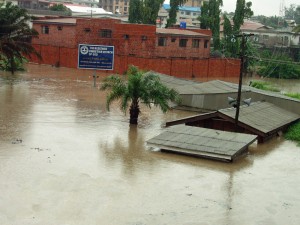
In July 2009, unemployed single mother of two children, Luisa Ono, ventured into rice faming after receiving a training on: “Rice for Job Project” by officials of the Lagos State Ministry of Agriculture, who enlightened participants on the supposedly lucrative business of cultivating Ofada Rice, and encouraged them to farm.
With her savings, she plunged into the business and was allocated one hectare of land to do the farming at Udena in Ogun State. Full of zeal and expectations, she brought in farm workers from Edo State to till the ground. Diligently, she followed all the stages advised by the agric officers, applying the herbicides, fertiliser and weeding at the directed time.
But she got what she did not bargain for: the rains were suddenly nowhere to be found and, unkindly, drought set in. The Agriculture Ministry officers, who apparently gave little tutorials in terms of the vagaries of weather, allegedly ignored pleas to help provide irrigation, such that the rice got blistered and led to an appalling harvest. The almost N300,000 invested in the venture went down the drain as there was not a single grain of rice to show for her effort.
But she was undeterred, she says, picking up the pieces of her life and she forged ahead.
Her words: “A year later, we were told to form a group of 10 farmers each and register with the Ministry of Agriculture for a World Bank grant under the Fadama Rice Farming Project. This was not without some financial implications and opening of bank account with contributions from the 10 of us, I being the only woman in this group. I spent up to N100,000 in contribution and all other expenses of transportation to the farm and meetings.”
According to Ono, members of the group were allocated six hectares of land, which they paid for. They likewise paid for the harrow, planting, herbicide and fertiliser, in an apparent bid to access the promised World Bank funding via the Lagos State Ministry of Agriculture.
But, alas, lightning struck the second time.
She says, “The 2010 farm yield again was poor due to limited rainfall and we did not realise anything from the rice farm and neither did we get the grant from the World Bank till date.”
Several kilometres away in Igbe, a farming community in Ikorodu unfolds a similar drama. Basil Oru, a peasant farmer, moans over the unsavoury scenario that has played out in recent years. He is one of the numerous migrant growers from the South-Eastern part of the country who have over the decades made Igbe their home. But the increasing temperatures along with the irregular rainfall pattern is affecting farm yield and threatening their source of livelihood, he discloses.
“The rain has not come and it is delaying the planting of certain crops whose cultivation coincides with the advent of the rainy season. The ripening of crops cultivated several months ago is also being delayed because of the late rainfall. And the heat is too much and it is affecting the plants and the soil. We are also losing our farmland because the land is being sold, in most cases without our knowledge, to people who wish to build homes and other commercial ventures,” Oru explains.
According to him, the state government has never come to their aid to alleviate their plight. He notes that some of his colleagues are forced to go into other ventures like riding okada (commercial motorcycle), working as security guards or trading, in order to make ends meet.
He stresses that, to adapt to the situation, he deals more in plantain cultivation, which he claims is resistant to harsh weather conditions. To complement this, he adds, he has shifted the farming site to swampy land, apparently because the soil there is still laden with moisture despite the drought condition upland on the conventional farmland.
Several weeks after this interview with him, Oru’s prayers were heard as the rains came, albeit intermittently. But that of Sunday, June 10 was unprecedented. It started at about 5.00am and poured continuously all through the day in torrents. Oru has stopped rejoicing for the rains he had prayed for; now, he is lamenting.
“A lot of the cassava I planted in March that is to be harvested in about 10-12 months’ time have become rotten due to too much water as a result of the flood that affected my farm. About one hectare and half of cassava farmland is affected,” he groans. “I am desperately trying to save over 100 plantain tress affected by flood, as the leaves are getting discoloured. I am currently creating a channel to drain away the flood water here.”
But Ono’s plight, it appears, is worse off. Smarting from her previous experiences, her house hunt had led her to a rented three-bedroom bungalow at Orisha in Magodo, where she has been residing since January.
She recalls “I prepared my children for church and off we went with our umbrellas. The rain increased its tempo from time to time and, at 2pm having waited for it to stop or abate to some reasonable extent but to no avail, I waded in with my two children, my church being some five minutes distance to Berger. We walked to the Ojodu-Berger Roundabout in search of transport. Commercial vehicles were unavailable due to the rain that had been falling incessantly. With only our heads and shoulders saved from the downpour because of our umbrella, we managed to engage a Keke Napep (commercial tricycle) who finally agreed to drop us at Orisha.
“On getting home, the rain continued. Meanwhile, my compound is situated down a hill and the house up the hill directly behind my compound four months ago built a gigantic fence. While the fence was being constructed, my landlord being an engineer approached the owner of the fence to utilise professional advice on the erection as that compound is known as a passage way for high speed water. He assured my landlord that the fence would have an opening for the water to find its way through.
“The owner of the fence had severally refused sound counsel on how to tackle the annual rush of water through his compound. He continued raising fences that block the passage way, thus leading to the collapse of these fences from time to time. These collapsed fences affect houses beneath, by falling close to them, sending debris or collapsing the sand on the hill and blocking doorways and windows of houses close to the section of the collapsed fence. All these I learnt after the incident as residents who came to the scene relayed their experience with the water and the fence.
“At 4pm that Sunday evening, I observed the intensity of the rain, the water from the top of the hill found openings at the sides of the fence, gushing out dangerously and digging chunks of sand that were falling close to my kitchen door and increasing the level of water to the kitchen steps. I watched dejectedly and made up my mind to move my family outside the bungalow as the water was going to flow in. I stepped inside the kitchen and bolted the door, placing rags under the door to control the rush of water and called out to my children to move over to the font of our home.
“While outside, I heard an ear-deafening and heavy crash, smash, breaking of glasses and mad rush of muddy water that rose inside the living room. The concrete fence had fallen against the house, crushed the sand beneath it, and pillars of concrete crashed into the house, smashed the kitchen iron door where I was standing minutes before and breaking glass windows and pouring in mud, water and dirt.
“I rushed to my bedroom to see to my important documents and certificates; boxes, beddings clothing, and everything was covered in thick mud flowing everywhere. The rain continued and the flood continued from the kitchen whose door had been destroyed by the concrete pillars protruding inside the house with iron rods and chunks of the concrete all over the floor. It was terrible.
“This incident took place between 5-6pm and neighbours could only come at about 8pm when the rain had subsided. We were advised to seek alternative shelter for the night. The whole compound apart from the front and the roof was covered with sand that extended to window and door levels and the gigantic fence broken into three huge boulders dangled on top of the sand posing further danger till now. My furniture, electronics, rug carpets, books and clothing, food items and kitchen utensils were all destroyed. These are replaceable items compared to our life and limbs that God protected. My laminated certificates I was able to clean and dry though sips of mud got into them.
“On Monday July 11, the Zone B Landlord Association in Orisha went up the hill to meet the owner of the fallen fence. He refused to come out and was rather mourning the loss of the fence he said he constructed with N2 million. Imagine!
“Up till now, nothing has been heard from the owner of the fence, even though my landlord has begun evacuating the sand with local labour and cracking the concrete behind to create access to the kitchen door that is twisted and suspended with sand and concrete. Subsequent rains make water from the hill to flow through the fallen fence directly through the open kitchen, into the living room, filling it up and sipping through the front door, bringing with it mud and dirt. We continue to bail water each time it rains. The owner of the fence stands each morning on the hill with his wife or visitors glancing down on his fallen fence and not a word of sympathy, or enquiry as to whether persons in the house are safe.”
Indeed, Ono is exasperated with her experiences in Lagos, and she desperately seeks some sort of succour. “I don’t know why I have become a victim of these incidents in Lagos State; I have just spent seven months in this house and would like to move out for safety of my life and children if I have the means. I want a safe haven free from violence and disasters.”
Environmental activist, Titilope Akosa, attributes the scenarios to extreme weather conditions as a result of global warming that, according to her, results in sea level rise, flooding, drought, storm surges, irregular rainfall pattern and rise in temperature in the state and beyond.
She says, “The current and potential impacts of climate change in Lagos indicate that the phenomenon will affect men and women differently and that climate change may likely exacerbate the existing gender inequality skewed against women. In Lagos, women constitute a significant proportion of people living below the poverty line; they constitute 41 percent compared to 59 percent men in formal public employment, they are under-represented in decision making positions and make up majority of subsistence farmers lacking access to and control of critical resources such as land, water and agricultural extension services.
“Ono is a typical example of the case of women’s vulnerability to climate change, which is also touching other issues like parenting because her ability to properly take care of her kids is seriously in doubt as a result of her current poor financial situation.”
In a reaction to Ono and Oru’s submissions, Permanent Secretary in the Ministry of Agriculture, Yakub Olajide Basorun, says that he is unaware of the cases, even as he urges persons in such situations to make formal complaints to government. He adds that his officials provide complete information and assistance to farmers.
His words: “We give them technical, market and weather information to make them successful farmers. At Udena, we have a lot of farmers there growing rice successfully. It is not true that we don’t provide irrigation facilities. In fact, we provide everything that they require, and all they need to bring is their labour. Besides, the area falls within the Ogun-Osun River Basin, which is naturally flooded.”
Basorun notes that after such training programmes similar to the one Ono attended, government ends up selecting “those that meet the criteria.”
“But some withdraw afterwards when they are no longer able to cope with the realities on ground, thinking that it’s a bed of roses. But we have 200 people currently involved in the project.”
He emphasises that the ministry is currently intervening in a case involving migrant farmers like Oru elsewhere in the state. “Have the Igbe farmers come to government to make a complaint? Is the government aware of their problem? Of course, we are not. We are trying to solve a lot of problems related to flooding being encountered by migrant farmers like Oru and the one ongoing in Iba is a typical example.”
UN to tackle Nigeria desertification
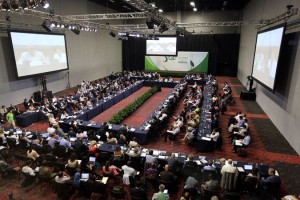
The United Nations Convention to Combat Desertification (UNCCD) will assist Nigeria to tackle her environmental degradation challenges especially those related to aridification.
The agreement was reached recently in Cancun, Mexico at a bilateral meeting involving a Nigerian delegation led by Environment Minister Laurentia Mallam and a United Nations (UN) team headed by UNCCD Executive Secretary, Monique Barbut, during the Fifth Assembly of the Global Environment Facility (GEF).
Barbut described Nigeria “as the biggest and legitimate voice in Africa,” promising that she would flag-off the intervention with a visit President Goodluck Jonathan before the year’s end.

The meeting also attracted dignitaries such as Permanent Secretary in the Federal Ministry of Environment, Rabi Jimeta; Director PRS/GEF Operational Focal Point; D. M. Dauda; Assistant Secretary General of the United Nations Environment Programme (UNEP), Ibrahim Thiaw; and Director General, United Nations Industrial Development Organisation (UNIDO), Li Yong.
Barbut underlined the need for countries to look more at the issues of drought being the highest human killer than any other crises in the world as, according to her, issues of land degradation and security pose more threat to livelihood of people especially Africans, which makes them poor.
She urged African countries to consider more seriously issues of land degradation which will along the line tackle problems related to climate change, biodiversity and pollution, while promoting Sustainable Land Management (SLM).
“African countries should come up with some concrete projects on land degradation management through synergy to tackle the issue of environmental degradation. African countries should do more in proper management of land than to consider its reclamation which is more expensive and in turn has negative effect on food security,” she stated.
Yong assured the role of UNIDO in promoting green growth in industries, noting that the body recently adopted a new mandate to make sustainability central to industrial development. He said future developments would be based on low-carbon technologies, even as he outlined a range of strategies UNIDO is adopting to support sustainable industrial development to include: getting public sector policies right; boosting knowledge networks to promote innovation and trade; and looking for synergies between international organisations’ green growth approaches to facilitate investment flows. He suggested that GEF-Nigeria and UNIDO work together in these areas under GEF-6.
Thiaw, on his part, advocated the need for Nigeria to work with UNEP on food security under the GEF-6, adding that Nigeria should seek for soft loans to form part of her co-financing mechanism.
While three projects were approved for Nigeria under the GEF-6 (Sixth Cycle), the Council endorsed the Work Programme comprising 37 new and two resubmitted project concepts, one non-expedited enabling activity, and one programmatic approach.
Nigeria, believed to be the only country (apart from Mexico) to fully participate in the Fifth GEF Assembly’s exhibition among the 183 member states, urged the GEF to assist countries in recovering degraded land and educating small-scale farmers to enhance food production and improve farmers’ livelihoods.
While Ethiopia stated that infrastructure plays a key role in building a nexus between energy, food and water issues. Saint Lucia proposed discussing trade and investment policies that promote investments in carbon-intensive infrastructure over renewable energy.
Furthermore, Senegal highlighted a national plan involving projects on agriculture and energy and wondered how the GEF could help countries pursue goals within such plans. Zambia, for the Southern Africa constituency, called on the GEF to support sustainable forest management, biodiversity, land degradation, climate change and chemicals management efforts in Southern Africa.
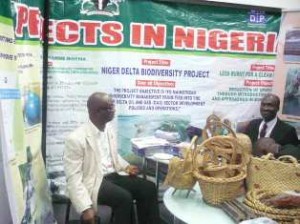
At the exhibition, Nigeria showcased her success stories and achievements over the past years in the implementation of GEF funded projects. While sharing knowledge on the peculiarity of the country and how GEF support has made a difference at all levels, officials demonstrated the linkages between the different ranges of project sizes and the existing strong partnerships with partners that have contributed to the successes experienced.
The Nigerian delegation also included delegates drawn from the Ministries of Environment and Finance, GEF Project Coordinators, Project Consultants and representatives of Civil Society Organisations (CSOs).
Lagos during rainstorm in pictures
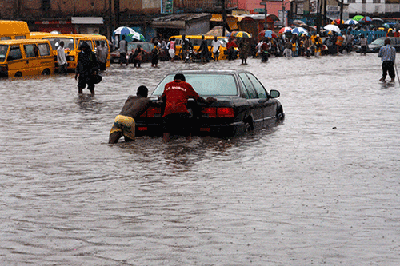
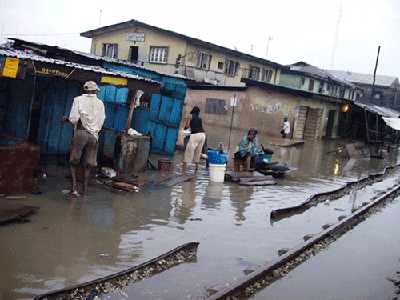
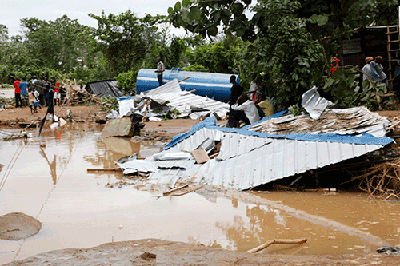
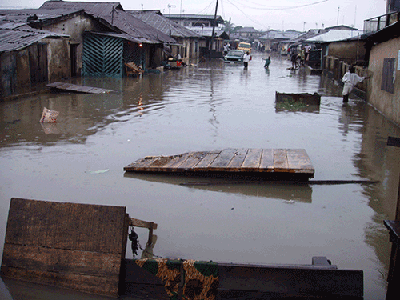
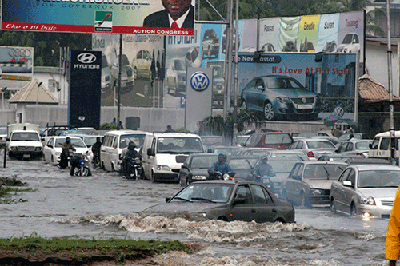

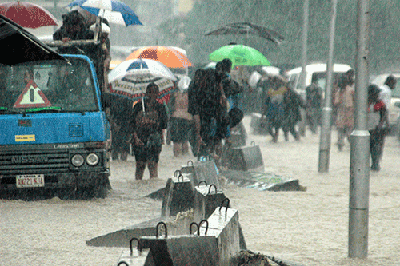

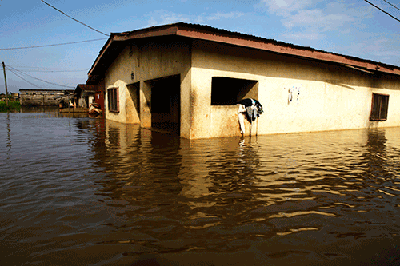
Ojo, Sanchez demand urgent climate action
Dr Godwin Ojo of the Environmental Rights Action/Friends of the Earth Nigeria (ERA/FoEN) and Shenna Sanchez of the Federation of Young European Greens (FYEG) at the intersessional ministerial meeting of the United Nations Framework Convention on Climate Change (UNFCCC) speak on behalf of global environmental groups, trade unions and youth groups, who had staged a walkout from the Warsaw Climate Conference to show indignation at alleged non-committal attitude of governments for, according to them, failure to take decisive and swift action against “the biggest threat to both people and the planet, and the continued domination and sabotage of the international climate talks by powerful corporate interests.”
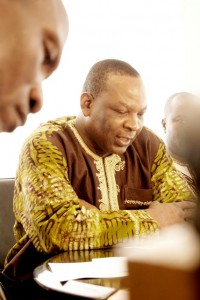
Collectively we represent millions if not hundreds of millions of global citizens.
Civil society organisations (CSOs), indigenous groups and citizens’ networks, among others, call for an energy transformation towards peoples’ and community energy – a transformation that delivers renewable and clean energy for those with energy, the billions without access to energy as well as generating millions of new green jobs.
We are people who participated in the walkout of the Warsaw Climate Conference and those who supported and united with its call for more serious climate action. We have come together to reiterate to all ‘leaders’ participating in the UN climate negotiations that they are dangerously off-track in addressing the climate emergency. We call upon them to listen to the demands and solutions of people.
The walkout was an act of protest and indignation over governments’ continued failure to take decisive and swift action against the biggest threat to both people and the planet, and an act of condemnation of continued domination and sabotage of the international climate talks by powerful corporate interests.
In the face of massive destruction, displacement and loss of lives caused by current levels of global warming and the certainty of much worse impacts in the near future, governments continue to choose to act in the interests of a wealthy few, and collude with big business to defend unsustainable consumption and production models ahead of the urgent need for a sustainable, ecological, and just world.
We are more determined than ever to fight for the survival of our families, our communities and our peoples across the world – a survival that rests on nothing less than the fundamental transformation of a system that has generated massive impoverishment, injustices and a climate crisis that threatens all life on earth. People are waging this fight in various arenas in every corner of the globe, over every dimension of their lives – food, energy, health and security, jobs and livelihoods.
People are mobilising everywhere and taking to the streets in bigger numbers and increasing intensity to stand up to vested interests and fight for their future and those of the next generations. People-driven solutions, compatible with planetary limits, are being created and asserted at local, national and global levels – aimed at meeting the needs of people rather than the relentless pursuit of profits for big business and wealthy elites.
We are back, far more strengthened in giving voice to those who are already acting with the urgency needed to avoid the worst impacts of climate change – the huge majority of civil society around the world that you, ministers, represent and cannot ignore any longer.
In the coming weeks and months, towards and during the Social COP in Venezuela, the People’s Summit and the COP20 in Peru, and the COP 21 in France, we will be fighting harder than ever for governments to:
- Commit to a global goal of limiting warming that recognises the latest IPCC’s warnings on the threats of tipping points, and to the right to food and food sovereignty, recalling that science suggests that 1.5C of warming would be too much for many vulnerable peoples and countries;
- Deliver a swift global transformation away from the use of dirty fossil fuel and destructive energy systems driving the crisis, towards a carbon-free and renewable energy economy that, primarily among others, is decentralised, community controlled, affordable, accessible to all people for their basic needs and well-being;
- Urgently scale up targets for emissions cuts in the pre-2020 period, and set emission targets comparable to the scale of the emergency for 2020-2025;
- Ensure equitable and fair sharing of efforts among all countries based on their historical responsibility, their capacities, and the urgency of the crisis;
- Enable people to deal with climate impacts by protecting the rights of peoples and communities, building resilience, addressing loss and damage, and ensuring a just transition to climate resilient, low carbon, equitable and democratic economy and society;
- Define and commit to concrete targets for the transfer of finance and technology to make global transformation possible; and,
- Reject the damaging influence of corporate interests on climate policy and prevent their promotion of false solutions as the global response to the climate crisis.
The global climate movement is building its strength and power in every country of the world. We call on those who claim to represent us to either act in our interests or step aside.
Solar power for rural areas: The Jigawa experience
 There is a revolution going on in Jigawa State. In what appears like the original blueprint for the Federal Government’s recently launched operation “Light-Up Rural Nigeria”, Governor Sule Lamido, right from the time he assumed office seven years ago, embarked on an aggressive programme of incubating a rural solar ecosystem. In pastoral communities which normally would never dream of seeing electricity in their midst because they are nowhere near the national grid, there suddenly comes power – street lights, electric powered boreholes, illuminations for homes, shops and Mosques – all supplied by the ever smiling sun over their habitat. So, overnight, Jigawa becomes home to clusters of off-grids, stand-alones and mini grids of renewable energy. Surely, were the much vaunted Peer Review Mechanism among states in Nigeria working as it should, by now, Lamido’s example would have catalysed a nationwide off-grid revolution.
There is a revolution going on in Jigawa State. In what appears like the original blueprint for the Federal Government’s recently launched operation “Light-Up Rural Nigeria”, Governor Sule Lamido, right from the time he assumed office seven years ago, embarked on an aggressive programme of incubating a rural solar ecosystem. In pastoral communities which normally would never dream of seeing electricity in their midst because they are nowhere near the national grid, there suddenly comes power – street lights, electric powered boreholes, illuminations for homes, shops and Mosques – all supplied by the ever smiling sun over their habitat. So, overnight, Jigawa becomes home to clusters of off-grids, stand-alones and mini grids of renewable energy. Surely, were the much vaunted Peer Review Mechanism among states in Nigeria working as it should, by now, Lamido’s example would have catalysed a nationwide off-grid revolution.
Granted, the Federal Government last January announced a move towards rural off-grids; but that is painfully late. For a country that is so irradiated with solar ambience that even the foremost renewable energy-deploying Germany wished it had some fraction of our sunlight, it is an unforgivable sin to allow our poor rural community dwellers continue living in darkness, and choking from kerosene lanterns and sundry carbon-spewing light sources.
Jigawa’s rural electrification via solar power is relatively cheap and fast to replicate. It also has the dual function of lighting up the villages and creating jobs at the same time. The mode of selection of sites for the off-grid solar project is based on democratic rotation of projects around the state’s three Senatorial districts. Twenty seven villages have been covered already, while three shall be powered this year. In each selected community, more than 60 households are beneficiaries, and then the general village benefits from the centralised streetlights, Mosque lighting and solar boreholes.
Then, in the spirit of the state government’s policy thrust of rural empowerment, the government constructs right in the centre of the beneficiary village, a solar enterprise lock-up shops which are rented out to local entrepreneurs who use them as business centres while paying a monthly token to the government for maintenance of the infrastructure. There are barbers, tailors, chemists (which effectively serves as village dispensary) and battery charging station operators, and other rural artisans taking up the shops.
Therefore, right inside the hidden enclaves of Jigawa villages, one will be taken aback to stumble across a sudden paradise where there is solar lighting for home systems, solar street lighting, solar lighting for public facilities, battery charging stations, solar enterprise lock-up shops, solar motorised water boreholes, solar vaccine refrigerators, and solar lighting back-up systems. This has a great resemblance to the solar centre paradigm which is used in other renewable energy-savvy developing countries, like Kenya, for energy efficiency and social enterprise purposes.
According to a renewable energy expert who explained the concept adopted by the Jigawa State Government, “This project will strive to spawn a grass roots solar industry that can sustain its momentum with new jobs and businesses that focus on system installation and maintenance. The solar-powered micro-enterprise buildings are the project centrepieces in each village. Each centre provides electricity to six very small businesses that would otherwise not have access to electricity. The shared PV (photovoltaic) system, much less expensive than individual systems for each shop, allows tailors to move up from manual sewing machines to electric; barbers, from manual clippers to electric, and similar improvements in productivity for other types of businesses.”
During the Federal Government’s Light-Up Rural Nigeria launch earlier in the year in Abuja, President Goodluck Jonathan said that the project had been initiated under the second phase of his government’s power sector reform programme planned for the post-privatisation period. He said the initiative was conceived primarily to promote the use of renewable energy, thereby assisting the vision of providing reliable electricity supply to all Nigerians. He also said the project would go a long way in providing clean, cheap and reliable renewable energy that would address some of the challenges of climate change in the country.
I have a word for the government as it gets set to start its nationwide rural solar electrification project. Renewal energy programme is not sustainable without appropriate government policies and legal frameworks which can bring in the private sector to drive the process. In other parts of the world, renewable energy policies have translated to renewable energy laws. In Nigeria we are still stuck with policies. Plenty of high sounding master plans and blue prints, but no action. This is a great discouragement to foreign investors who want to come to Nigeria and invest in our richly endowed natural environment.
Without the appropriate laws – for instance, Feed in Tariff (known generally as FiT) and net metering rules – the planned nationwide renewable energy power projects shall end up as another cesspool of corruption and graft. What is more, after this government leaves office, and if the next government is not interested in it, which is more likely than not, this remarkable initiative shall become an abandoned project, and then the wheels of our renewable energy development will grind back to the starting point at ground zero.
In Jigawa State today, this is the big albatross facing the whole populace. They are all keeping their fingers crossed that the next governor would be as visionary, benevolent and environment-friendly as Lamido, who does not wait for international donors and development partners to fund the rural off-grid projects. His 100 per cent fund-allocation to the rural solar project effectively presents a sustainability question. The project executors are now in the drawing board room cudgelling their brains to come up with probable post-2015 strategies for the laudable projects. One of the potential strategies is Public Private Partnership, which ironically still begs the question – without appropriate renewable energy laws, PPPs are nonstarters at best.
Experts all over the world aver that without proper government support, renewable energy projects cannot stand. In Nigeria, a scientific study has arrived at the same conclusion. In 2012, an investigation to know if off-grid electrification using solar photovoltaic panels is economically viable, conducted by Akpan Uduak Sylvester and Ishak Salisu Rabiu, was released. The “Electricity Access in Nigeria” investigation has the following to say.
“In line with the government’s target of ensuring 80 per cent electricity coverage in Nigeria by 2015, this study examined the viability of using solar photovoltaic panels in a decentralised off-grid electrification project for a typical rural community in Northern Nigeria. The choice of Northern Nigeria is based on its solar energy potential, and low population density. The study compared the total cost of providing electricity using solar PV panels for 25 years to a rural community of 50 households, and an electricity load of 82.7kilo watts with that of paying electricity tariffs assuming grid connection was possible.
“The results show that such project will not be economically viable at the prevailing commercial interest rate. However, the viability of the project significantly increases if there is adequate government support through the provision of low interest loans or financial grants (as production subsidy). Such subsidy will not result in economic waste since the target is clearly defined. Apart from government, financial incentives, removal of barriers to private investment e.g. legal and regulatory barriers and proper risk management will make the project more viable. The following recommendations are hereby made: Government should create support mechanisms to support private sector investment in off-grid electrification programmes to meet the 80 per cent electricity coverage by 2015; a clear legal and regulatory framework should be established to incorporate the private sector in the rural electrification plan.”
By Greg Odogwu
Why Biosafety Bill should not sail through, by Bassey
Opposition has emerged from within the National Conference over the prospects of the Biosafety Bill, which is presently awaiting Presidential endorsement to become law.
The Science, Technology and Development Committee of the confab in its report presented to the floor had on Page 34 urged President Goodluck Jonathan to speedily act on the proposal.

But a member of the Environment Committee, Nnimmo Bassey, says the Science, Technology and Development Committee’s call should not be accepted. According to him, the bill, as drafted, is pro-industry and does not adequately protect the people and biodiversity.
Bassey, Director at Health of Mother Earth Foundation (HOMEF), states: “The Biosafety Bill has no provisions for strict liability and redress. The fundamental flaws of HB.184 are that it
does not mention the issue of liability and redress; does not contain meaningful provisions ensuring effective public participation; does not take into account the precautionary principle; and, contains inconsistent language to an extent not acceptable.”
He points out that, before endorsement, the Biosafety Bill should include strict liability and have sanctions for pollution by genetically engineered products. He adds that polluters should be liable to a fine of not less than N100 million for corporate bodies and their directors committed to no less than five years imprisonment or both.
“With regard to redress, the polluter should be subject to the same penalties as above, but in addition should be held responsible for the restoration of polluted or contaminated environments and should make adequate compensation for the victims,” he stresses, adding that protection of biodiversity is cardinal, but modern biotechnology erodes biodiversity.
“Nigeria is party to the Convention on Biodiversity (CBD) and one of its key pillars is the Precautionary Principle. This principle as the name implies calls for caution when there is doubt. Nigeria should not go the way of allowing genetically modified organisms (GMOs).
“We do not need a National Biodiversity Conservation Authority as proposed by the committee. There are sufficient departments in the Ministry of Environment to handle the expected duties. The proper ministry to handle Biosafety issues is the Federal Ministry of Environment and should not be moved to the Ministry of Science. Biosafety issues are mostly about environmental issues.”
Bassey’s other comments on Science, Technology and Development include: “On page 16 at item (f) the Committee described products of our educational system as academically unsound and morally bankrupt. Although this is not a recommendation, the characterisation is objectionable.
“On page 18, item 1.5j – exposure to science and technology should be extended to primary schools and not just adult education classes.
“On Page 32, item 3.19(ii) – the Committee asks for “adequate funding” for nuclear technology. With the Fukushima nuclear accident and considering the poor state of our power generation structures, Nigeria should invest more in renewable power generation rather than investing in a technology that countries like Germany are moving away from.”
ERA to Shell: Stop sloganeering and clean up Ogoniland
The Environmental Rights Action/Friends of the Earth Nigeria (ERA/FoEN) has expressed reservations about remarks credited to the new chief executive officer of Shell, Ben Van Beurden, to the effect that the company is set to implement the United Nations Environmental Programme (UNEP) assessment of Ogoniland.

Van Beurden, who is currently on a visit to Nigeria, disclosed that he would toe a different approach to responding to community demands compared with his predecesors on the heels of criticisms the company received at its Annual General Meeting (AGM) in The Hague late last month for failing to clean up spills in Ogoniland three years after the UNEP recommendation were made.
But, in a statement issued in Lagos, ERA/FoEN said that Shell’s pledge to clean up the Ogoni environment is part of the company’s charade to buy time while actually doing nothing.
ERA/ FoEN Executive Director, Godwin Ojo, said: “The sweet remarks of Shell’s CEO is nothing new. It is the usual rhetoric of systematic delay, feigning compliance while doing nothing to undo the environmental terrorism and ecocide it has wrought in Ogoniland”

“Unless there is hard evidence, Shell cannot be trusted by mere promises. We doubt that Shell will now put on a new garb hence challenge the company to show more transparency and accountability by disclosing the funds it claimed it has set aside for the implementation of the UNEP recommendations.
Fifty years of baskets of unfulfilled promises makes us circumspect. We suspect that this is another basket full of lies given that the UNEP report was released three years ago and virtually no commitment has been made during this period. All that Shell has done is kicking and screaming against the report.”
Ojo pointed out that the unholy romance between some top government officials and Shell officials was responsible for the lack lustre approach of the government to compelling the company to embarking on cleanups and remediation of the environment, even as he added that, ” the government setting up of the Hydrocarbon Pollution Restoration Project (HYPREP) was and still remains a ploy to not implement the report”
ERA/FoEN demands an end to this grand deception which has pushed the Ogoni people to the fringes of existence. Shell must promptly comply with the UNEP recommendations. Mere talk is unacceptable,” Ojo insisted.
WED 2014: Youth groups plant trees, engage children
Connected Development (CODE), in collaboration with the African Youth Initiative on Climate Change (AYICC), last week engaged in tree planting and sensitisation in local nursery and primary school and held round table discussions on climate change mitigation to commemorate the 2014 World Environment Day (WED) in Abuja, Nigeria.
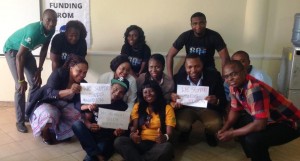 The event, tagged “Tree Planting exercise, sensitisation and round table discussions on Climate Change in Nigeria,” rallied around taking actions and engaging pupils of Abuja Children’s Home Nursery & Primary School on the importance of tree planting, its social and economic benefit to combat global warming and to the global mitigation efforts with local actions.
The event, tagged “Tree Planting exercise, sensitisation and round table discussions on Climate Change in Nigeria,” rallied around taking actions and engaging pupils of Abuja Children’s Home Nursery & Primary School on the importance of tree planting, its social and economic benefit to combat global warming and to the global mitigation efforts with local actions.
Hamzat Lawal, the Chief Executive of CODE, educated pupils and teachers of the school on how current life style contributes to global warming, leading to change in weather pattern, heavy rain fall, and improper disposal of waste which contributes to flooding and affects students to access timely education in affected communities.
“Today’s tree planting exercise is also to show our support to the Small Island Developing States (SIDS) as a way of raising our collective voices and not the sea level,” Hamzat said.
Maria Yepwi, Head Mistress of the school, commend the organisers while stressing the need for more tress to be planted and commitment to ensuring that the planted trees are properly nurtured and for the organisers to visit other public schools.
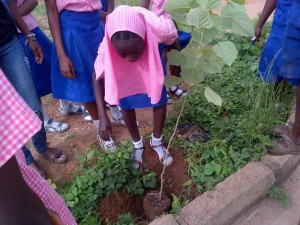 John Sanni, a pupil of the school, said he never knew his actions could contribute to climate change and promised to tell his friends in other schools to plant trees for the planet.
John Sanni, a pupil of the school, said he never knew his actions could contribute to climate change and promised to tell his friends in other schools to plant trees for the planet.
The Nigerian Youth Round Table Discussion on Climate Change was geared towards taking stock on climate change advocacy/actions by young people. “Youth should be mainstream into the process, because the impact of climate change will be more on the younger generations, it is important to make sure that climate change information gets to the grassroots to enable the young people know what it’s all about and, through those interactions, more young people will get involved in climate change mitigation,” stated Lawal.
Participants underlined for the need for young people to synergise and work together to ensure that their advocacy efforts are taken to the next level with concrete actions. They also stressed need to hold governments accountable for its actions, while calling on the Federal Government to sign the Climate Change Bill which, according to them, will enable a dedicated institution that will handle climate change issues with a strong legal framework.
The CODE is a non-government organisation whose mission is to improve access to information and empower local communities in Africa. It seeks to strengthen local communities by creating platforms for dialogue, enabling informed debate, and building capacities of marginalised communities towards bringing about social and economic progress within communities, while promoting transparency and accountability.
The AYICC is an umbrella initiative of all youth organisations in Africa working on climate change issues. Currently, it has a membership of over 200 youth organisations with over 25,000 individuals and chapters in 42 Africa countries. AYICC’s vision is to create an African continent with an empowered and united youth movement, proactively involved in the decision making process and the adoption of sustainable options towards a better climate and social equity.


